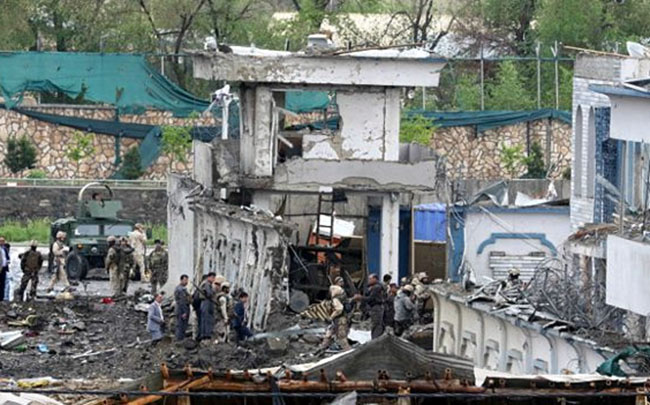The Taliban’s Tuesday’s attack in Kabul shocked the whole nation and renewed questions over the prospects of security and stability in Afghanistan. The bombing was the first major devastating militant attack in the country after the Taliban announced the group’s spring offensive more than a week ago. A day after the bombing, officials updated the tolls, putting the tolls to 64 dead and 347 injured. According to the officials, most of the casualties are civilians; while in the meantime, there are unofficial reports of much higher number of casualties from the employees and operatives of the National Directorate (NDS) for Security. The attack is said to be the deadliest in the capital in last five years, and seems to be ushering a difficult year ahead for the Afghan government struggling to contain the Taliban’s fresh resurgence.
The Tuesday coordinated assault on the NDS department responsible for providing security to dignitaries and government officials will have inevitable consequences and potential impacts on the war and peace efforts. The immediate consequence would be growing calls on the government to improve security and boost the military campaign against the Taliban. The Afghan government is coming under increasing pressures to escalate its response against the Taliban’s spring offensive. The government has been accused of lack of war leadership and mismanagement of the anti-insurgency campaign. Reacting to the Tuesday’s bombing in Kabul, President Ashraf Ghani said the government would avenge for every drop of the bloods spilled in the attack in Kabul.
However, such comments by the government leaders are going to do little to ease public unease over the deteriorating security in the country. The national unity government has been credited with taking some concrete measures to ensure there would sufficient support from the international community, particularly NATO and the United States, to the embattled Afghan security forces. The national unity government has managed to get weaponry and warplanes from Afghanistan’s international supporters. It has also managed to improve relations and security partnership with the US as the main donor and supporter of Afghanistan in the international community. This will help the Afghan security forces to do better performance in providing security and fighting the Taliban.
However, the government has long been criticized for its infighting and, as the result, the failure to appoint key officials to the top security posts. Many of the setbacks against the Taliban have been, rightly or wrong, attributed to the lack of the military leadership and the NUG’s failure to fill the vacant security posts. The recent attack in Kabul will put further pressures on the national unity government to fix the faults in the leadership of the security agencies. The deterioration of security and in particular the Tuesday bombing in Kabul will further lower public confidence to the government efforts to maintain security and contain the Taliban’s seasonal fighting.
There have long been criticisms even from high-ranking officials holding key government posts that the government is not serious enough to fight the Taliban. Many accused some within the government to be as Taliban sympathizers and not having the resolve and determination to seriously fight the militant groups. Many accused the government of having lenient policies towards the Taliban and avoiding labeling the group as terrorists. President Ghani is quoted as saying to the Taliban that “we didn’t have the resolve to kill you, but you are forcing us”. Does the statement suggest the government is going to take tougher stance in the fight against the Taliban? The time will prove it. However, what is clear is that the government has no way but to use all the possible military means to first win the war on the battleground and then go to the table of peace negotiations.
Many expect that such large-scale militant attacks would have immediate harmful impacts for the relations between Afghanistan and Pakistan, as the core facilitator of the Afghan peace talks. However, the indications are otherwise. Despite some security officials suggesting the attacks as being planned on Pakistan’s soil, the government of Afghanistan this time avoided to directly blame or accuse Pakistan over the Taliban insurgency and the Tuesday bombing in Kabul. The national unity government has been credited for pursuing the four-nation peace strategy that established a mechanism for cooperation between Afghanistan, Pakistan, China and the US, and the four-way initiative is still the best hope of the government to pursue peace talks with the Taliban while Pakistan plays a facilitating role in the process.
Unlike the major explosion in Shah-e Shahid area of Kabul last year which propelled Ashraf Ghani to take a tougher stance against Pakistan, the reaction this year from the Afghan government has been calm. The Shah shahid explosion resulted to quick deterioration of relations between Kabul and Islamabad with Afghanistan accusing Pakistan of harboring. This is while almost all major security incidents in Afghanistan in the past used to affect the bilateral relations between Kabul and Islamabad. A presidential spokesman in Kabul said the government would continue cooperation with Pakistan in seeking peace through the four-nation initiative. The Afghan government has called on Pakistan to take action as it has promised against the militants refusing to enter peace talks with the Afghan governments. But there are little signs of Pakistan taking any concrete action against Taliban leadership.
Home » Opinion » The Impacts of Kabul Bombing
The Impacts of Kabul Bombing
| Abdul Ahad Bahrami

